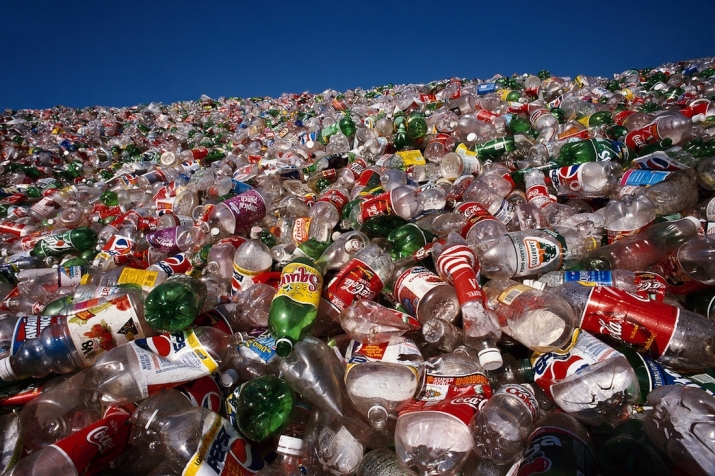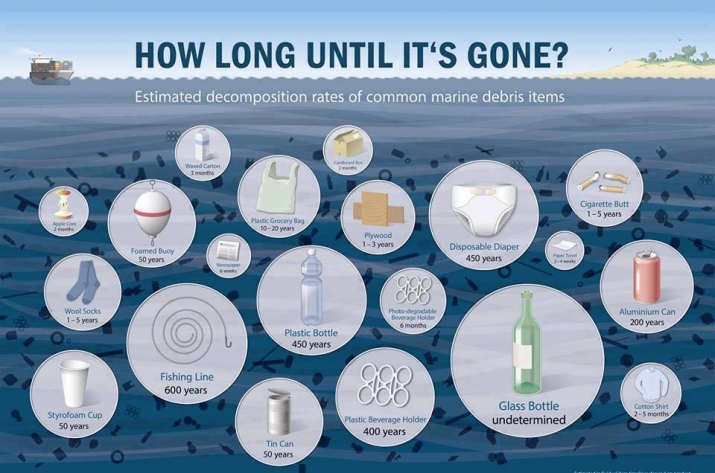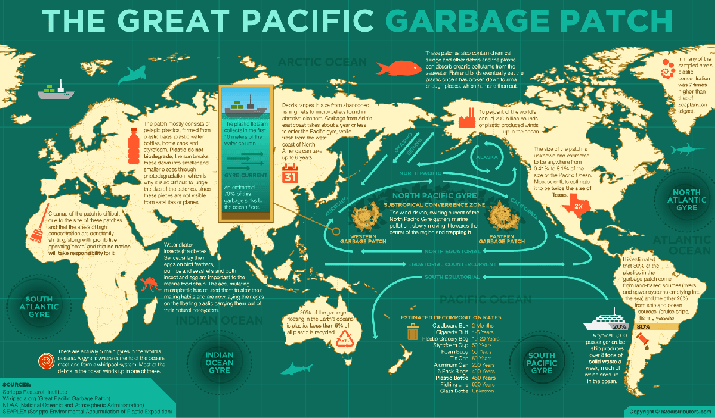NEWS
Do Plastic-eating Microbes Offer a Solution to Pollution?
 Some 56 million tons of PET were produced in 2013, but only around half of the material is ever recycled. From greenriverplantation.net
Some 56 million tons of PET were produced in 2013, but only around half of the material is ever recycled. From greenriverplantation.netPlastics are everywhere—present in almost every facet of our daily lives. But once manufactured, these vast quantities of plastics remain with us for decades, sometimes hundreds of years, whether or not we still need them. Offering perhaps a glimmer of hope, researchers in Japan have discovered a strain of bacteria that has evolved to consume the type of plastic commonly used in disposable water bottles, synthetic fibers, and food packaging.
The microbe is called Ideonella sakaiensis, named after the Japanese city of Sakai in which it was discovered growing on a polymer called polyethylene terephthalate (PET). It is the very qualities that make PET attractive—its durability and resistance to water—that also make it a danger to the environment. PET takes a long time to biodegrade—it is thought that plastic bottles may take up to 450 years to break down—so it accumulates in landfills and the world’s oceans. Some 56 million tons of PET were produced in 2013, but only around half of the material is ever recycled.
The team of scientists from the Kyoto Institute of Technology and Keio University collected 250 PET-contaminated samples including sediment, soil, and wastewater from a plastic-bottle-recycling site in Sakai. The scientists found that a particular type of bacteria was responsible for degrading PET using two enzymes, reporting that a community of I. sakaiensis could break down a thin film of PET over six weeks in a steady temperature of 86 degrees Fahrenheit, eventually converting the plastic into carbon dioxide and water.
“It’s the most unique thing,” said Kyoto University microbiologist Shosuke Yoshida, lead author of the study published in the journal Science. “This bacterium can degrade PET and then make their body from PET.” (npr)
 Unrecycled waste, especially plastics, can take hundreds of years to break down. From reallysavvy.com
Unrecycled waste, especially plastics, can take hundreds of years to break down. From reallysavvy.comSome scientists say the bacteria could eventually help break down similar waste in landfills or recycling plants. “We now have a chance to biologically degrade the widespread plastic PET,” said Uwe Bornscheuer, a biochemist at Greifswald University in Germany. “That is, of course, a major achievement.” (The Wall Street Journal)
John Coates, a microbiologist at the University of California, Berkeley, was cautiously optimistic on the potential of the new discovery, noting that with more research bacteria might be engineered for such a purpose. “It’s certainly a move in the right direction. Having an organism that seems to be capable of biodegrading these components directly will help us develop a bioremediation technology,” he said. (npr)
A more likely application for the bacteria would be in reducing industrial waste during plastics manufacturing, according to Prof. Rolf Halden, a director at the Center for Environmental Security at Arizona State University, who cautioned that it would be difficult to apply the microbes to a large percentage of the plastics now scattered throughout the environment. “The discovery of PET-devouring bacteria is encouraging scientific progress that should be flanked by replacing present-day plastics with greener, more sustainable alternative materials,” he said. (The Wall Street Journal)
Tracy Mincer, a researcher at the Woods Hole Oceanographic Institution in Massachusetts, observed that while it was not immediately clear whether the microbe could reduce the vast quantities of plastics that end up in the world’s oceans, the research could make it easier to identify similar microbes. “This process could be quite common,” said Mincer. “Now that we know what we are looking for, we may see these microbes in many areas around the world.” (Phys.org)
 A large proportion of our waste eventually finds its way into the world's oceans. From bookyourdive.com
A large proportion of our waste eventually finds its way into the world's oceans. From bookyourdive.comWhile such discoveries may eventually help us resolve the growing global damage caused by plastic waste, the fact remains that plastics continue to accumulate in the environment at an alarming rate. While an immediate answer remains out of reach, we can all play an active role in helping to ameliorate the issue by participating in recycling programs and—perhaps more importantly—by consuming and disposing of less plastic.*
* Tips to Use Less Plastic (Green Education Foundation)
16 simple ways to reduce plastic waste (Mother Nature Network)
See more
A bacterium that degrades and assimilates poly(ethylene terephthalate) (Science [subscription only])
Newly discovered bacteria can eat plastic bottles (Phys.org)
New Species of Bacteria Eats Plastic (The Wall Street Journal)
We Just Discovered Bacteria That Can Eat Our Plastic (Co.Exist)
A Plastic-Eating Bacterium Might Help Deal With Waste One Day (npr)
Discovery of plastic-eating bacteria could lead to new ways to recycle (The Verge)
Japanese scientists discover plastic-eating bacteria (Down to Earth)














